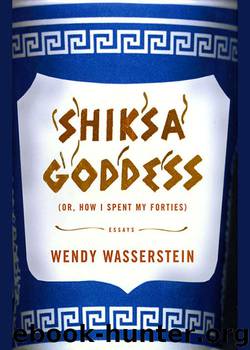Shiksa Goddess by Wendy Wasserstein

Author:Wendy Wasserstein
Language: eng
Format: epub
Tags: Fiction
ISBN: 9780375413506
Publisher: Knopf Doubleday Publishing Group
Published: 2001-07-30T16:00:00+00:00
Heidi Chronicled
During my years in the mid-sixties at the Calhoun School in New York, the greatest hits of female preparatory-school drama departments were largely of the convent and weeping-widow genre: Cradle Song and García Lorca’s The House of Bernarda Alba. Also popular were the abbreviated Trojan Women and the mini Lysistrata. At Calhoun, during the gaudeamus igitur curtain call of the annual Latin-class Saturnalia show, the Velcro hooks on our Fieldcrest twin-sheet togas came unfastened, proving for all the parent body the true value of a classical education: Nulla res melior spectaculo est—or, very roughly, there’s no business like show business.
In the late 1960s, when junior-year women were admitted to the male bastions of ivy, the walls of single-sex education came tumbling down. Amherst College, for instance, experimented with the very balanced ratio of 23 in-house females, of which I made up a twenty-third, to 1,200 males. Rather than in convent plays, I was suddenly appearing nightly in leather as Beryl the Dominatrix in a dormitory-basement production of Terrence McNally’s one-act, Noon. For my senior year, I returned to Mount Holyoke and the comfort of an all-female audience.
Twenty-five years later, and a month after Jamie Lee Curtis wrapped her film portrayal as Heidi Holland in my play The Heidi Chronicles, Anna Cash made her ninth-grade debut in the Brearley School all-female production. The entire upper school was present for the performance. Sitting in the balcony were the proud parents, mostly in their forties and looking suspiciously like academics, doctors, and assorted serious good people. Indeed, Anna Cash’s mother is the novelist Mary Gordon.
If “The Rime of the Ancient Mariner” is about a man who shot a bird, The Heidi Chronicles is about a feminist art historian who gets sad. The play follows the life of Heidi—not the goat girl or the Beverly Hills matchmaker—from a Miss Crain’s school dance in 1965 to her choice to adopt a baby alone in 1989. In the Brearley interpretation, Anna Cash appeared and began the play’s opening monologue—an art history lecture about ignored women artists—in front of a slide painting by Sofonisba Anguissola (circa 1559). The upper school at Brearley is apparently big on irony: Miss Cash got a house laugh on “This portrait can be perceived as a meditation on the brevity of youth, beauty, and light—but what can’t?” On Broadway, the line often didn’t even get an educated smirk.
The girls giggled through the Miss Crain’s dance scene. Tenley Laserson was very hip as Chip Boxer, the cool boy in Weejuns and a tweed jacket, still a familiar type at first-rate female prep schools. When Rachel Grand as Scoop Rosenbaum asked Heidi to go to bed with him in the 1968 Eugene McCarthy mixer scene, I noted the first bit of revisionism. In The Heidi Chronicles for grown-ups, Scoop says he can’t promise Heidi “equal orgasms.” At Brearley, Scoop couldn’t promise Heidi an “equal relationship.” The most interesting bit of nineties invention came in the women’s-rap-group scene. Fran, a physicist, was described in an Ann Arbor women’s-consciousness-raising rap group in 1970 as an “open” lesbian.
Download
This site does not store any files on its server. We only index and link to content provided by other sites. Please contact the content providers to delete copyright contents if any and email us, we'll remove relevant links or contents immediately.
| Coloring Books for Grown-Ups | Humor |
| Movies | Performing Arts |
| Pop Culture | Puzzles & Games |
| Radio | Sheet Music & Scores |
| Television | Trivia & Fun Facts |
Spell It Out by David Crystal(36090)
Professional Troublemaker by Luvvie Ajayi Jones(29633)
We're Going to Need More Wine by Gabrielle Union(19010)
The Secret History by Donna Tartt(18977)
Cat's cradle by Kurt Vonnegut(15279)
The Goal (Off-Campus #4) by Elle Kennedy(13628)
The Social Justice Warrior Handbook by Lisa De Pasquale(12172)
The Break by Marian Keyes(9343)
Crazy Rich Asians by Kevin Kwan(9242)
The remains of the day by Kazuo Ishiguro(8916)
Thirteen Reasons Why by Jay Asher(8861)
Educated by Tara Westover(8021)
The handmaid's tale by Margaret Atwood(7714)
Giovanni's Room by James Baldwin(7283)
Win Bigly by Scott Adams(7155)
This Is How You Lose Her by Junot Diaz(6849)
The Rosie Project by Graeme Simsion(6327)
Six Wakes by Mur Lafferty(6208)
The Power of Now: A Guide to Spiritual Enlightenment by Eckhart Tolle(5698)
